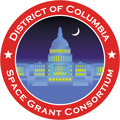About the Space Grant Program
Space Grant consists of state-based and university-led consortia in each of the 50 states plus the District of Columbia and the Commonwealth of Puerto Rico. Annually, each consortium receives funds from Congress to develop and implement STEM-based student fellowship and scholarship programs; interdisciplinary space related research infrastructure, education, and public service programs; and cooperative initiatives with industry, research laboratories, and state, local, and other governments. Space Grant operates at the intersection of NASA’s interest as implemented by alignment with the Mission Directorates and the state’s/district’s interests. Space Grant is primarily a higher education program, although it also supports middle and high school activities, informal education, and public outreach.
History
The National Space Grant College and Fellowship Program (Space Grant) was established in 1988 by the United States Congress and is administered by the National Aeronautics and Space Administration (NASA).
District of Columbia Space Grant Consortium (DCSGC) Mission Statement
Our mission is to support NASA’s goals by contributing to STEM workforce development in the District of Columbia, utilizing the unique resources of our diverse affiliate institutions through programs in internships/fellowships/scholarships, research infrastructure, higher education, precollege, and informal education, to increase public knowledge, support educators, and attract and retain students to pursue STEM advanced degrees and careers.
DCSGC Goals
• Competitively provide NASA Internships/Scholarships/Fellowships (NIFS) to meet the needs of NASA and DC, with an emphasis on women and underrepresented minorities.
• Support students and faculty in STEM research opportunities at NASA Centers and universities.
• Attract, recruit, and retain students to pursue advanced STEM degrees and/or careers.
• Recruit precollege students to pursue STEM disciplines in college by providing opportunities for precollege students and teachers.
• Inform and inspire DC citizens about NASA themes and STEM content.





